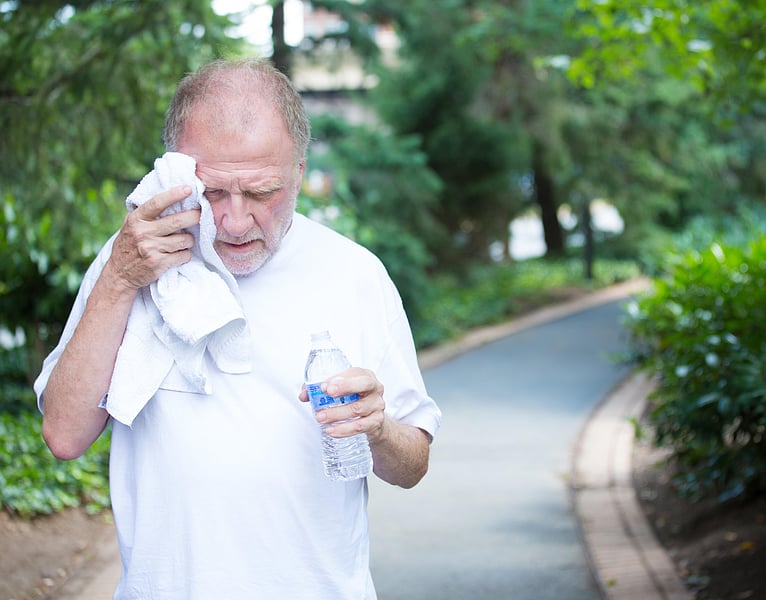Get Healthy!

- Cara Murez
- Posted September 11, 2023
Old Age & Heat Can Be Deadly Combo: Tips to Stay Safe
Hot weather can pose serious health risks for older adults.
Existing medical conditions, problems moving around and medications raise the risk of heatstroke, according to an expert at Rush University Medical Center in Chicago.
Being prepared can help prevent heat exhaustion and heatstroke.
"As we age, we become less efficient at noticing and adjusting to the heat,"geriatrics specialist Dr. Juan Cobo said in a center news release. "We sweat less, slowing our ability to cool down. At the same time, we become less sensitive to thirst. By the time we feel thirsty, we're already dehydrated to some degree."
Certain conditions and medications add to the risk that someone will overheat. These include lack of mobility because it may be hard for a person to get up and move to a cooler spot or get a drink of water.
Heart and vascular diseases make it harder to adjust as the temperature rises, according to Rush.
People with diabetes, kidney disease, dementia and depression can also become dehydrated more easily.
Those who have heart failure should ask their doctor how much they should drink to avoid dehydration without taking in too much water, Cobo advised.
Many prescription and over-the-counter drugs make it harder to stay hydrated. Several can lower blood pressure too much or contribute to confusion.
When these medicines are combined, the effects are multiplied, Cobo said.
"Patients often take diuretics for blood pressure, which releases fluids, and they may take a beta blocker to slow their heart. If they have knee or other joint pain, they may take ibuprofen or another NSAID,"he said. "Then they go outside to their garden on a very warm day, and they don't realize they are thirsty. Their fluids are depleted and now their sodium and potassium and magnesium levels aren't normal. This can lead to confusion, dizziness, dehydration and even kidney damage."
Antidepressant and anti-anxiety medications, antipsychotics, antihistamines and other types of allergy relief, cholesterol and blood sugar-controlling prescriptions, and over-the-counter pain and migraine aids are among those to keep an eye on.
Awareness is important, and so is having a plan for hot days. The medical center suggests the following:
- If you live alone, have mobility issues or take medication that creates heat sensitivity, keep water by your side.
- Don't drink caffeinated or sugary drinks or alcohol. Set a timer to remind yourself to drink water.
- Be aware of temperatures inside and outside the home.
- Keep the house cool, but not too cool. An ideal temperature is between 68 and 78 degrees.
- Contact a family member or your city's information line to find a cooler location if your house is too hot.
- Stay in touch with family or friends.
- If you have concerns about your medications or how you're feeling, contact your doctor's office.
Younger folks should check in with older family members or neighbors when hot weather is forecast. Check the temperature inside their home if you can. Talk with them about their options for a safe, cool space. Know the danger signs and when to get help.
Heat exhaustion can quickly become heatstroke, which is a life-threatening condition.
Symptoms of heat exhaustion are weakness, headache, flushed face, fast heartbeat, dehydration, dark-colored urine or little urine output, little or no saliva, tiredness, dizziness or light-headedness and abdominal cramps.
Someone who becomes overheated indoors should drink water or a sports drink, loosen their clothing and call a family member or friend. Call the doctor if you have any health concerns.
"If heat exhaustion worsens to heatstroke, it's an emergency,"Cobo said.
Weakness and confusion are symptoms of heat exhaustion, so it may be up to family and friends to see the signs and react. Move your older loved one to a cooler location and ensure they are drinking fluids. They may need immediate or even emergency medical care, Cobo said.
More information
The U.S. Centers for Disease Control and Prevention has more on heat stress in older adults.
SOURCE: Rush University Medical Center, news release, Sept. 7, 2023








